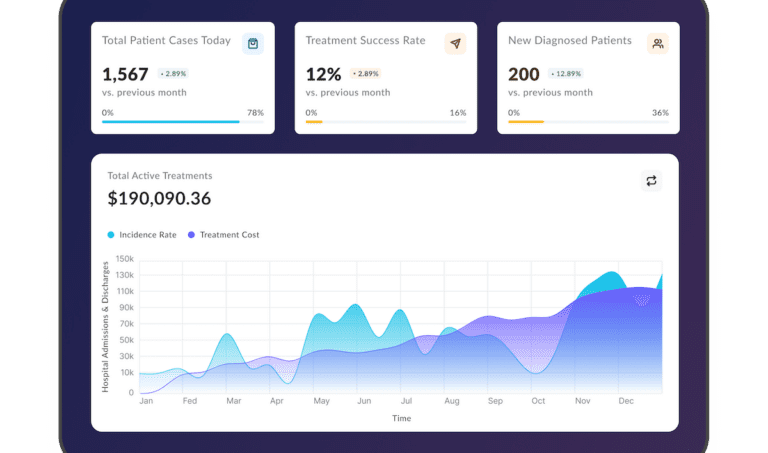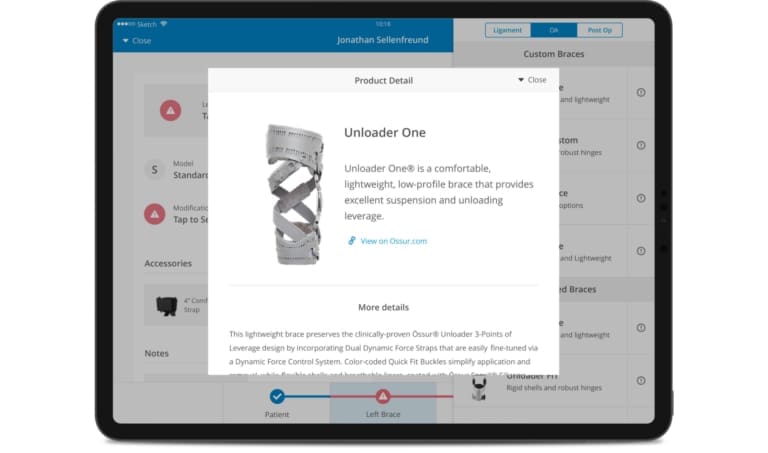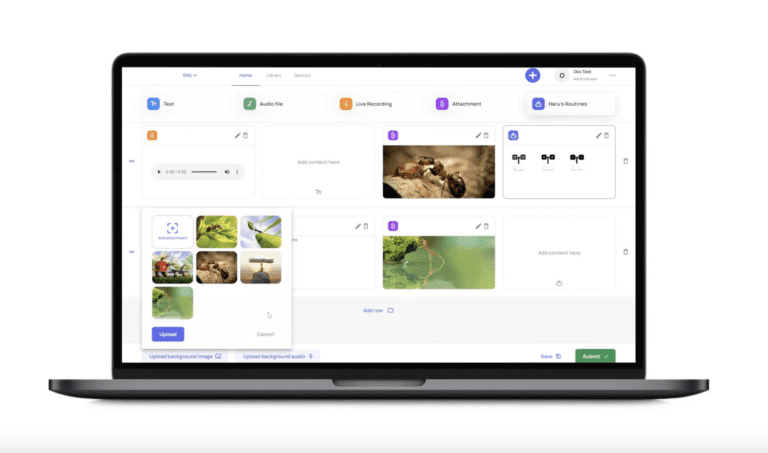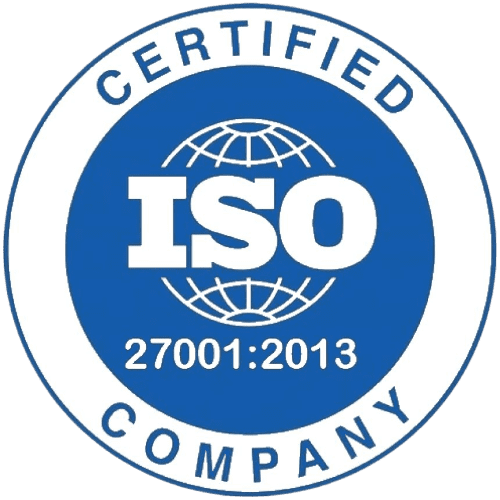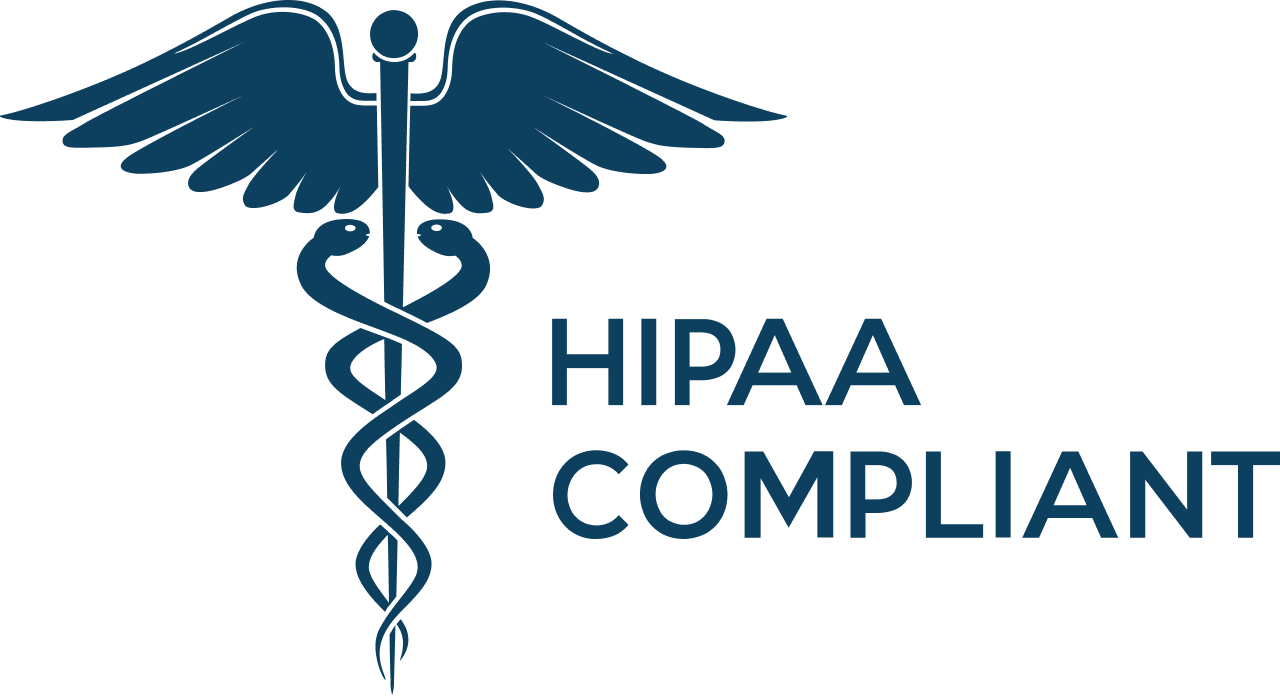Things You Should Know About Data Processing Agreement (DPA) In Software Development Outsourcing
Updated: October 17, 2024
Would you hand over your business’s most sensitive data to a third-party developer without any guarantees of its security and confidentiality? Sounds risky and even insane, right? For businesses that consider IT outsourcing services, a Data Processing Agreement (DPA) is that guarantee—keeping your data safe, your legal team happy, and GDPR fines at bay.
DPA is an absolutely essential document that defines how your data is processed, stored, and protected when working with external vendors. And since virtually any business depends on outside entities to manage or store data, it turns out that the DPA agreement is a must-have. What is DPA in business, and what is its role in software development outsourcing? That’s what we’re going to talk about in this post.

We provide companies with senior tech talent and product development expertise to build world-class software. Let's talk about how we can help you.
Contact usTable of Contents
What is a Data Processing Agreement (DPA)?
In simple terms, a DPA is a legally binding document that both you (the data controller) and your service provider (the data processor) sign to ensure personal data is handled securely and in compliance with privacy laws like the GDPR in the EU or similar laws in the USA, China, India, etc. This document describes how the parties are going to protect the data, what they can and can’t do with it, and what happens if things go wrong.
DPA meaning in business actually has little difference from the general DPA meaning in terms of data protection. In both cases, it’s about setting clear rules and boundaries to protect sensitive information. But in a business context, the stakes are much higher, to be more precise, your company’s reputation and the legality of your operations.
Why does this Matter in Outsourcing?
When you work with a software development company or use any other service that involves personal data collection and management, you give another company access to information that could seriously hurt your business if mishandled. A data processing agreement ensures that your vendor is held accountable for keeping that data safe. It spells out important things like what security measures need to be in place, how long data can be kept, and what happens if there’s a breach (think hefty fines and reputational damage).
So, we can distinguish four key purposes of a DPA in outsourcing agreements:
- Data Privacy Protection. DPA sets clear rules on how the data processor should manage, store, and secure personal data.
- Compliance with Data Protection Laws. Having DPAs with each third-party provider that has access to or processes data in any way is obligatory to comply with regulations.
- Risk Mitigation. A DPA contract can help mitigate the risks associated with data breaches and other data security incidents and prevent disputes as it clarifies who is liable in case of a breach.
- Transparency and Accountability. DPAs improve transparency and accountability in outsourcing relationships, ensuring that both parties clearly understand their roles and responsibilities.
The Role of Data Processors and Controllers
When it comes to personal data management with the help of third-party vendors, the most important part is to understand the roles of each party. Both are crucial, but their responsibilities are different. If they don’t get it right, your business could face some serious data protection headaches.
Who is a Data Controller?
A Data Controller is the decision-maker, the one who calls the shots about how and why personal data is processed. Whether it’s collecting customer information or handling employee records, the controller determines the purpose and legal basis for processing data. Their responsibilities don’t end there—they must also guarantee that the information is used securely and in full compliance with laws. In short, if something goes wrong, the controller is the one who’s ultimately accountable for how that data was handled.
Who is a Data Processor?
The data processor, on the other hand, is more like the hands-on worker who acts on the controller’s behalf. They process data on behalf of the controller, but they don’t get to decide why the data is being processed or how it’s used. Their job is to implement the controller’s instructions and take all the necessary measures to ensure data confidentiality and integrity. Unlike the controller, processors aren’t involved in the decision-making process about the purpose or legality of data processing, but they still play a critical role in making sure data is handled correctly and safely.
Why is a DPA Essential in Software Development Outsourcing?
When you opt for software development outsourcing, handing over sensitive data is part of the deal. Regardless of whether you share customer records, financial information, or intellectual property, the information needs strong protection. The data processing agreement helps you define how exactly the external software development vendor should manage the data and which security measures to apply to safeguard it against unauthorized access, breaches, or misuse. And that’s a legal document that holds the vendor accountable in case of non-compliance or data breach.
Let’s take a scenario where you outsource the development of a mobile app where users submit personal data, and you don’t have a DPA in place. If the developer mishandles that data—whether by not securing it properly or accidentally leaking it—you could face legal liabilities, data protection fines, and a loss of trust from your users. Non-compliance under this scenario is considered a minor violation and incurs a fine as high as €10 million or 2% of the company’s annual revenue according to GDPR. Not only would you be on the hook for the breach, but you also wouldn’t have a clear path for accountability or remediation because the rules weren’t clearly set from the start.
Without a DPA, the information is legally free for all. You have no guarantee that the third-party developer follows the best data protection practices or even complies with the law. Do you really want to take that risk? We don’t think so.
So, when do you need a DPA? Here are a few examples of when a DPA is an absolute must when outsourcing software development:
- Processing Personal Data. If the outsourcing project involves processing personal data (e.g., customer information, employee records), a DPA is essential to comply with data protection laws.
- Sensitive Data. If the project involves highly sensitive data (e.g., financial information, medical records), a DPA is crucial to protect against unauthorized access and misuse.
- Cross-Border Data Transfers. If the data will be transferred to a country with different data protection laws, a DPA can help ensure compliance with both domestic and international regulations.
- Partnership with a non-EU-based development partner. A data processing agreement helps you prove that the company you collaborate with is GDPR-compliant and can guarantee high levels of data protection.
Key Components of a Data Processing Agreement
Considering the big role DPA plays in securing your outsourcing relationship, it’s difficult to stress how vital it is to include all the essential requirements for data protection. While it’s free to customize and tailor to your specific needs, there are core clauses to outline. So, what sections should a good DPA agreement include to cover your data protection needs fully? In short, here are the six most vital topics you should have in a DPA.
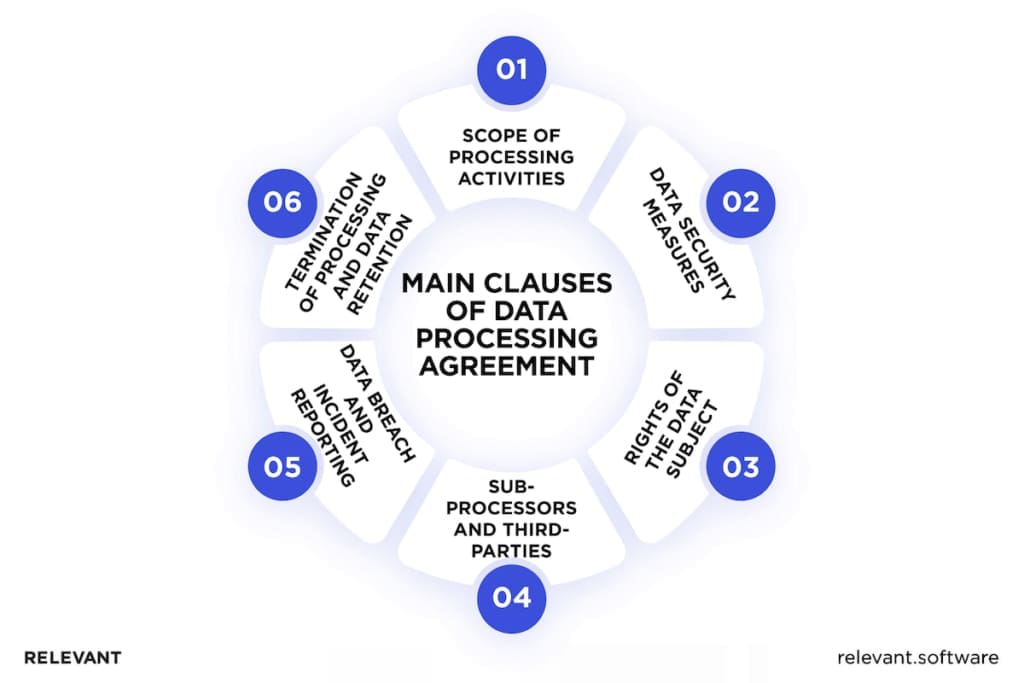
Scope of Processing Activities
The first thing a solid DPA covers is what data will be processed, how, why, and by whom. That’s where you define exactly what the vendor can do with the data. Will they process customer orders? Analyze user behavior or manage payroll data? The DPA should specify these activities to prevent any misinterpretation or misuse. For example, if you outsource the development of a CRM system, the DPA should specify that customer contact information will be processed solely for customer support purposes, not for marketing unless explicitly stated.
Data Security Measures
Compromise on security is unacceptable, and your DPA must detail the specific measures the vendor has to implement to keep the information safe. We’re talking about encryption (both at rest and in transit), access control (who gets to see what), and techniques like pseudonymization, which masks personal identifiers. For instance, if you outsource to a cloud service provider, the DPA document should specify that all data is encrypted using industry-standard methods and that only authorized personnel can access it.
Rights of the Data Subject
Data privacy laws say that individuals have the right to control their personal data, including the ability to access, modify, or remove it. A DPA should clearly outline how your external partner will support these rights. For example, if a customer requests that their data be deleted from your system, the DPA should ensure the vendor processes that request promptly and completely.
Sub-processors and Third Parties
So, you’ve trusted an external vendor with your data—but what happens if they outsource part of the work to someone else? Yes, you guessed it right. A good data processing agreement makes sure that if your vendor engages sub-processors, those third parties are held to the same data protection standards as your original agreement.
For example, if your software development vendor works with a cloud storage provider, they need to ensure that the provider follows the same strict data protection practices you agreed to. After all, you can’t have a strong security plan if one link in the chain is weak.
Data Breach and Incident Reporting
No one likes to think about a data breach, but the reality is that it can happen. That’s why your DPA must include clear steps to follow in the event of a security incident. The data processor is obligated to notify you—the data controller—if there’s any unauthorized access, leak, or breach of the data they handle on your behalf. And we don’t speak about days or weeks later. For example, GDPR prescribes a 72-hour reporting window for breaches. Therefore, your DPA should specify this timeline and outline the steps the processor will take to contain and mitigate the issue.
Termination of Processing and Data Retention
What happens when your business relationship with the vendor ends? The DPA document needs to have a clear plan for this, too. When it is terminated, there should be no ambiguity about what happens to the data. Will it be returned to you? Permanently deleted? Kept for a specific time due to legal requirements?
The DPA should spell out exactly what happens next. For example, if you’ve been working with a vendor for years and decide to switch to a new provider, you don’t want your old data hanging around on their servers indefinitely.
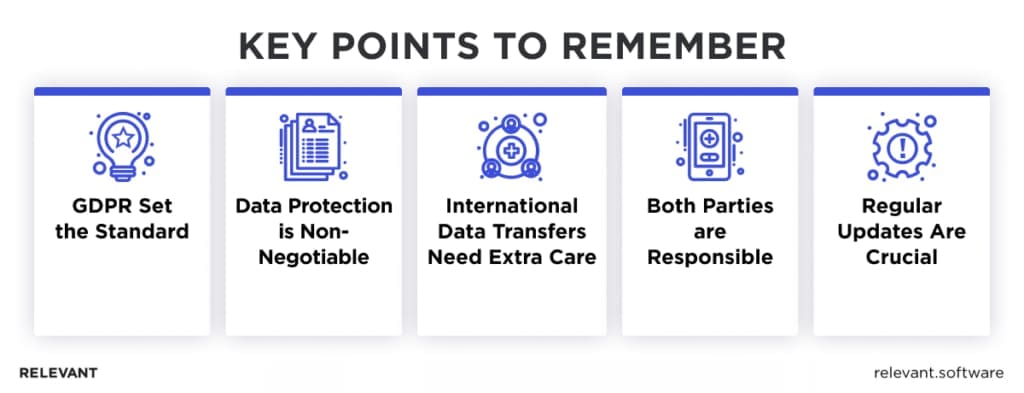
Compliance with GDPR and Other Data Protection Laws
We believe there is no need to tell why complying with data protection laws matters. Simply put, it’s just impossible to run a business without complying with data privacy laws. And DPA plays one of the major roles in keeping you compliant with GDPR and similar regulations related to data security.
The Role of GDPR in Shaping DPAs
The GDPR (General Data Protection Regulation) was the first to introduce clear and detailed DPAs. Before GDPR was enforced in 2018, some agreements were vague about how data should be handled. Now, GDPR mandates that DPAs must include clear and specific terms about data processing, security measures, and the rights of data subjects. This law forces both data controllers (you, the company) and data processors (the vendor) to be explicit about what they’re doing with personal data.
Under GDPR, controllers are responsible for ensuring that their processors handle data lawfully, while processors must follow the controller’s instructions and implement strong security practices. Both are on the hook if things go wrong, so it’s in everyone’s best interest to get the data processing agreement right.
International Data Transfers and DPAs
Outsourcing often means data transfer across borders, and this can get tricky fast. GDPR has strict rules on international data transfers, especially when the data is sent outside of the EU to countries that don’t offer the same level of data protection. So, how does DPA help you tackle this?
One common solution is using Standard Contractual Clauses (SCCs), which were previously endorsed by the European Commission and ensure that non-EU processors offer the same level of data protection as EU-based companies. Another option is Binding Corporate Rules (BCRs), which large multinational companies can use to transfer data securely within their group. Both mechanisms are designed to keep your data protected, no matter where it’s headed, and your DPA will outline which method is being used.
Best Practices for Drafting a DPA in Software Development Outsourcing
To draft a good data processing agreement, it’s crucial to customize it to fit the specifics of your project as well as ensure that it meets the legal requirements. Here are some recommendations to follow to save time and create a comprehensive DPA.
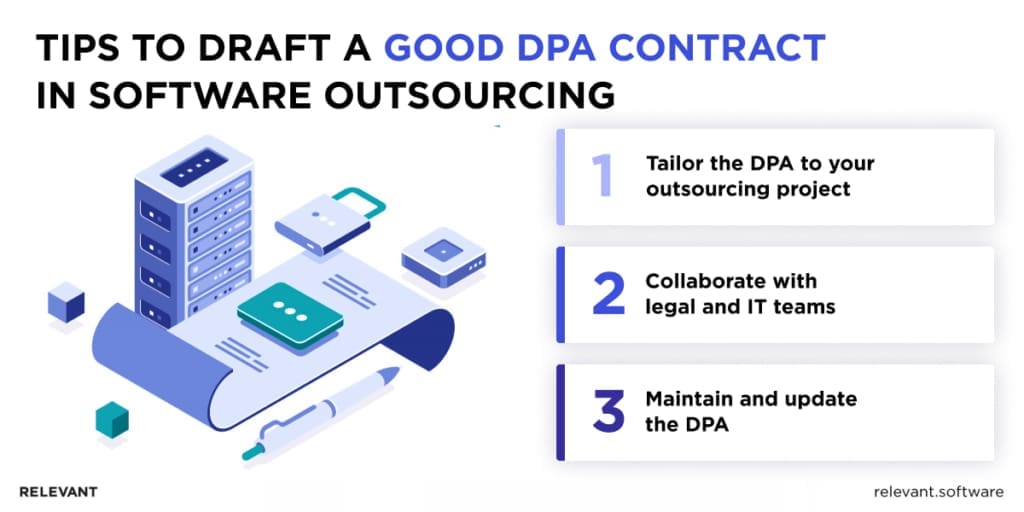
Tailoring the DPA to Your Outsourcing Project
The agreement should be customized to match the scope, duration, and nature of your outsourced project. Do you work with financial data, customer information, or proprietary code? Different data types require different security measures.
For a short-term project, you might not need extensive retention policies, but if it’s an ongoing partnership, those rules need to be crystal clear. The key is to align the DPA with the specific risks and needs of your project—don’t just use a generic template. The better it fits, the more protected you’ll be.
Collaborating with Legal and IT Teams
You should involve legal and IT departments when drafting DPA. The legal team will take care of compliance with relevant data protection laws, while the IT team ensures that the security measures (like encryption and access control) are practical and effective.
For example, if your IT team uses specific encryption protocols, the legal team needs to reflect that in the DPA. As you can see, the collaboration between these two departments is critical as it keeps you covered from all angles.
Maintaining and Updating the DPA
A DPA isn’t a “set it and forget it” kind of document. Technology and regulations change, and so do the outsourcing relationships. Therefore, we recommend you regularly review and update the DPA so it remains relevant.
For instance, if your vendor starts using new sub-processors or changes their security infrastructure, the DPA should be updated to reflect that. Similarly, if data privacy laws change (as they often do), you’ll need to revise the DPA to stay compliant.
Common Pitfalls to Avoid When Negotiating a DPA
When negotiating a DPA, it’s important to account for not only the initial terms but also any potential amendments. Also, you should be careful because it’s easy to overlook important details that can cause problems down the line. We outlined some common difficulties to help you avoid mistakes that can cost you more than a heavy fine.
Overlooking Data Ownership and Responsibilities
One of the biggest mistakes is failing to clearly define who owns the data and who is responsible for its processing. If your DPA doesn’t explicitly state that the data controller (you) retains ownership of the data, you could face legal trouble later on if there’s a dispute. It’s essential to specify that while the vendor processes the data, they don’t have ownership or any rights to it. Make sure roles and responsibilities are well-defined—ambiguity here can lead to massive compliance and operational risks.
Inadequate Security Provisions
Another major pitfall is that the DPA does not include detailed security protocols. You can’t just rely on the vendor to handle things in good faith. For this reason, your agreement should outline specific security measures the vendor you work with must use to secure data. Without these clear provisions, your data could be left vulnerable, and your business may be liable if a breach occurs. A vague commitment to “industry standards” isn’t enough—be precise.
Failing to Address International Data Transfers Properly
If you outsource software product development services to a vendor outside your home country, cross-border data transfers become a significant risk area. Many businesses fail to include proper mechanisms, such as Standard Contractual Clauses (SCCs) or Binding Corporate Rules (BCRs), to ensure compliance with GDPR or other data protection laws. Failing to address this can lead to legal exposure, especially in regions with strict data protection regulations. Always make sure your DPA includes clear guidelines for international data transfers and adheres to the legal frameworks that govern such transfers.
Data Processing Agreement: Summary
Don’t gamble with your business’s reputation. A DPA is your insurance against data breaches and fines. It’s far easier to draft and sign a data processing agreement and stick to its terms than to face the hefty price of a GDPR fine later on. Or even worse, a data breach that could damage your reputation and lead to customer loss. Yet, DPA is more than just a legal requirement; it’s also a cornerstone of trust in vendor-client relationships. It gives both parties peace of mind and ensures everyone knows their role and takes certain responsibility for secure data management.
At Relevant, we understand the significance of this type of software outsourcing document and have integrated DPA signing into our product development process. We believe that a lack of a DPA template can significantly hinder the cooperation process, as clients worry about legal concerns rather than focus on the core software development project. By taking care of this upfront, we streamline the onboarding stage and go straight to the actual development so no legal issues stand in the way of your project progress.
Curious about how we can make your outsourcing experience smooth and secure? Contact us to learn more.
Our core services:
Do you want a price estimate for your project?
Do you know that we helped 200+ companies build web/mobile apps and scale dev teams?
Let's talk about your engineering needs.
Write to us